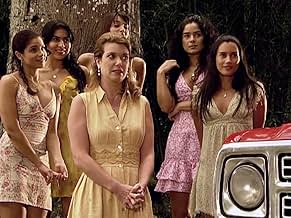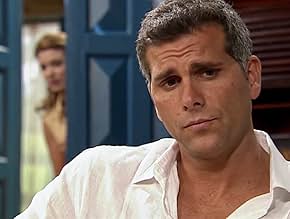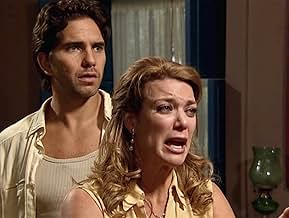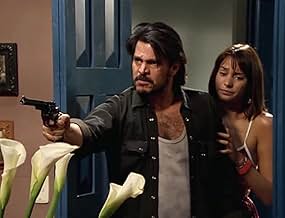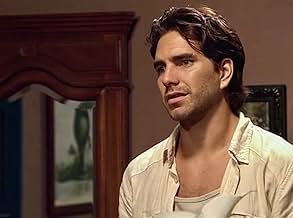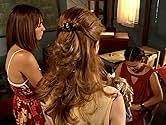Ajouter une intrigue dans votre langueA beautiful woman wants revenge twenty years after her lover's murder.A beautiful woman wants revenge twenty years after her lover's murder.A beautiful woman wants revenge twenty years after her lover's murder.
- Récompenses
- 1 nomination au total
Parcourir les épisodes
Histoire
Le saviez-vous
- ConnexionsVersion of Doña Bárbara (1943)
- Bandes originalesHoy La Pasion
Performed by Estela Diaz
Commentaire à la une
The classic anti-heroine couldn't be coming to TV again at a better time and Edith Gonzales is Telemundo's greatest casting coup. The role of Joselyn in MUNDO DE FIERAS was excellent preparation for this interpretation of "la devoradora", the devourer of men. She is seductive, but has no relationship skills. She has no maternal feelings toward her own daughter. We're not supposed to like Doña Bárbara, but the many women who have suffered the sort of abuse she did undoubtedly were cheering when she disposed of Perro de Agua and want to see her get away with it. She uses witchcraft and murder to get what she wants. She is clearly driven by the abuse she suffered in her youth, but has no idea that completing her revenge will not lead to peace or even satisfaction.
Most of the other cast members are quite good, especially Christian Meier, Lucy Martinez, Katie Barbieri, Paolo Quevedo, Arap Bethke, and Roberto Mateo. At least most of their accents blend or match; Genesis Rodriguez' does not, which contributes to the ongoing annoyance factor with her character. We're supposed to sympathize with the childlike Marisela, but I mostly find her annoying and not just when she's difficult to understand.
The period of the novel is the early 20th century; however like many recent novelas -- the production is flawed because of its mixing of anachronisms. There are old-fashioned typewriters and no telephones in a town where people have no idea what a movie is, but Mauricio has a 1980s boom box and music CDs and a laptop computer. The spoiled, frivolous, and petulant Luisana has breasts that are obviously enhanced by a plastic surgeon, and Bárbara comments on this. There was no such thing in the period of Gallegos' masterpiece, which was written as a statement on social change involving progress from ignorant superstition into enlightened modernism. I find it rather difficult to believe that there is anywhere in Venezuela where any of these things are presently unknown. This would have definitely been better done as 1928 instead of 2008.
The music in this production mixes character leitmotifs with suspense, romance, black magic, and ironic humor, the latter element somewhat unexpected but somehow appropriately handled. The monotone of the opening lines of the theme song reflects the hypnotism that the title character practices on her victims as the lyrics talk about what she wants and can't have. It's a sharp contrast with the savage atmosphere around the characters, the river scenes, and the feeling of near-isolation from any semblance of civilization. It calls for a soundtrack CD.
Definitely worth your while and I hope it follows the novel to the letter.
Most of the other cast members are quite good, especially Christian Meier, Lucy Martinez, Katie Barbieri, Paolo Quevedo, Arap Bethke, and Roberto Mateo. At least most of their accents blend or match; Genesis Rodriguez' does not, which contributes to the ongoing annoyance factor with her character. We're supposed to sympathize with the childlike Marisela, but I mostly find her annoying and not just when she's difficult to understand.
The period of the novel is the early 20th century; however like many recent novelas -- the production is flawed because of its mixing of anachronisms. There are old-fashioned typewriters and no telephones in a town where people have no idea what a movie is, but Mauricio has a 1980s boom box and music CDs and a laptop computer. The spoiled, frivolous, and petulant Luisana has breasts that are obviously enhanced by a plastic surgeon, and Bárbara comments on this. There was no such thing in the period of Gallegos' masterpiece, which was written as a statement on social change involving progress from ignorant superstition into enlightened modernism. I find it rather difficult to believe that there is anywhere in Venezuela where any of these things are presently unknown. This would have definitely been better done as 1928 instead of 2008.
The music in this production mixes character leitmotifs with suspense, romance, black magic, and ironic humor, the latter element somewhat unexpected but somehow appropriately handled. The monotone of the opening lines of the theme song reflects the hypnotism that the title character practices on her victims as the lyrics talk about what she wants and can't have. It's a sharp contrast with the savage atmosphere around the characters, the river scenes, and the feeling of near-isolation from any semblance of civilization. It calls for a soundtrack CD.
Definitely worth your while and I hope it follows the novel to the letter.
Meilleurs choix
Connectez-vous pour évaluer et suivre la liste de favoris afin de recevoir des recommandations personnalisées
- How many seasons does Doña Bárbara have?Alimenté par Alexa
Détails
- Date de sortie
- Pays d’origine
- Langue
- Aussi connu sous le nom de
- Donja Barbara
- Société de production
- Voir plus de crédits d'entreprise sur IMDbPro
- Durée41 minutes
- Couleur
Contribuer à cette page
Suggérer une modification ou ajouter du contenu manquant

Lacune principale
By what name was Doña Bárbara (2008) officially released in Canada in English?
Répondre

